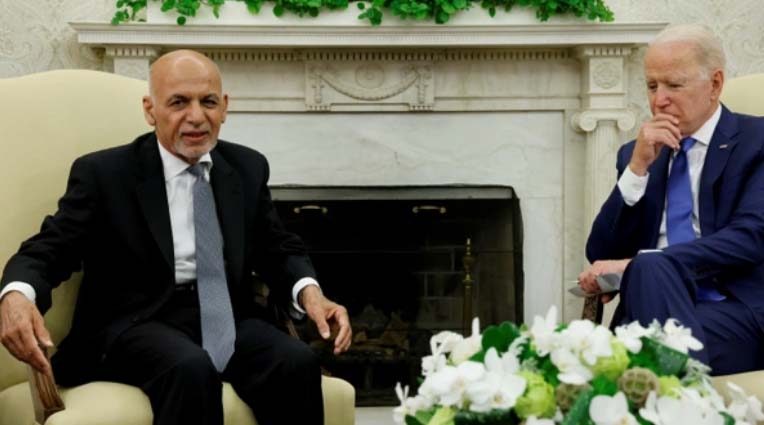
AFP, WASHINGTON :
US President Joe Biden promised Afghan leader Ashraf Ghani strong support during a White House meeting Friday but made clear he was not planning to slow the US withdrawal after nearly two decades of fighting.
Less than three months before his deadline for the removal of all troops, Biden told Ghani that Afghans had to determine their own fate even as they face a mounting offensive by Taliban insurgents.
“The partnership between the United States and Afghanistan is not ending,” Biden said in the Oval Office.
“Our troops may be leaving, but support for Afghanistan is not ending.”
Even so, Biden told the Afghan president, “Afghans are going to have to decide their future, what they want.”
“The senseless violence, it has to stop. It’s going to be very difficult.”
– Deal with Taliban pushed –
Ghani was in Washington along with Abdullah Abdullah, who oversees Kabul’s peace negotiations with the Taliban, amid rising uncertainty over the group’s recent gains and the possibility of their return to power.
The extremists subjected the population to a brutal version of Islam when they ruled from 1996-2001.
Sitting next to Biden, Ghani acknowledged that Biden was not going to change course from his April announcement ordering the end to America’s longest war.
“President Biden’s decision has been historic, it has made everybody recalculate and reconsider,” Ghani said.
“We are here to respect it and support it.”
But he also said not to count his government out, amid reports that an internal US intelligence assessment says the Taliban could possibly take over Kabul within six months of the US departure.
Ghani said Afghan government forces retook six districts, in the north and south, on Friday, reversing recent Taliban gains.
“You will see that with determination, with unity and with the partnership, we will overcome all odds.”
Ghani met with top members of Congress, the CIA, and US Defense Secretary Lloyd Austin on his two-day visit to Washington.
With the US military’s on-the-ground support for Afghan security forces about to disappear completely, Washington is expecting him to reach a negotiated settlement on power sharing with the Taliban before it is too late.
“The Department of Defense is deeply invested in the security and stability of Afghanistan and in the pursuit of a negotiated settlement that ends the war,” Austin told Ghani and Abdullah at the Pentagon.
The top Democrat in Congress, Nancy Pelosi, also indicated that there was no turning back. Meeting Ghani, she stressed future humanitarian assistance to the country “as we enter a new phase of that relationship.”
– No abandonment –
The US pullout, of some 2,500 troops and 16,000 civilian contractors in the country earlier this year, could be mostly completed next month.
The situation was being compared to the US withdrawal from Vietnam in 1973, which saw the South Vietnamese government that Washington had backed fall to North Vietnamese troops within two years.
“The false narrative of abandonment is just false,” Ghani said before his meeting with Austin.
He added that predictions like that of the intelligence report on a possible Taliban takeover “have all turned out false.”
Biden is expected to reaffirm billions of dollars in US aid for the country, and make arrangements for US civilian contractors — essential to keep the Afghan air force flying — to remain there.
The administration is also working on a plan to evacuate some 18,000 Afghan interpreters and others who worked for US forces and who are under personal threat from the Taliban.
Another key issue was how to guarantee the security of US diplomats who remain in the country. A large contingent of US Marines is expected to remain to protect the embassy.
Meanwhile, Washington is in talks with Turkey to secure the capital city’s airport.
The United States will also provide three million doses of Johnson & Johnson coronavirus vaccine to Afghanistan to be shipped as soon as next week, according to White House spokeswoman Karine Jean-Pierre.
But a key goal of Ghani in Washington was to demonstrate that Biden still supports him, said Andrew Watkins, an Afghanistan expert at the International Crisis Group.
“Ghani doesn’t have a lot of domestic legitimacy. His legitimacy comes, maybe more than from any other source or any other factor, from international recognition and support,” Watkins said.

